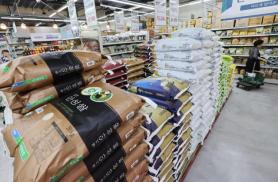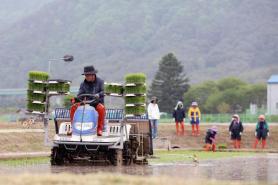
South Korean farmers stage a performance of opposing rice imports. [Yonhap News Photo]
In 2015, the annual consumption of non-rice grains rose 1.1 percent on-year to 8.8 kilograms per person, according to data compiled by Statistics Korea.
Annual rice consumption, however, fell from 128.1 kg in 1985 to 62.9 kg in 2015. Daily rice consumption fell 3.3 percent on-year to 172.4 grams last year as South Koreans eat less than two bowls of rice every day.
The decrease in rice consumption led to a surge in the rice inventory that stood at 1.82 million tons at the end of February.
Last year South Korea produced 4.32 million tons of rice but this year's rice consumption is forecast to stand at 3.97 million tons, resulting in a surplus of 350,000 tons. South Korea should also import 409,000 tons of rice under this year's obligatory rice quota.
Rice is still the main energy source here, but South Koreans now consume more coffee than their staple food, according to a survey by the Korea Centers for Disease Control. Alternative and processed food are getting more popular while the perception that too much carbohydrate is unhealthy also played a role in the dietary trend.
Aju News Lim Chang-won = cwlim34@ajunews.com
Copyright ⓒ Aju Press All rights reserved.



